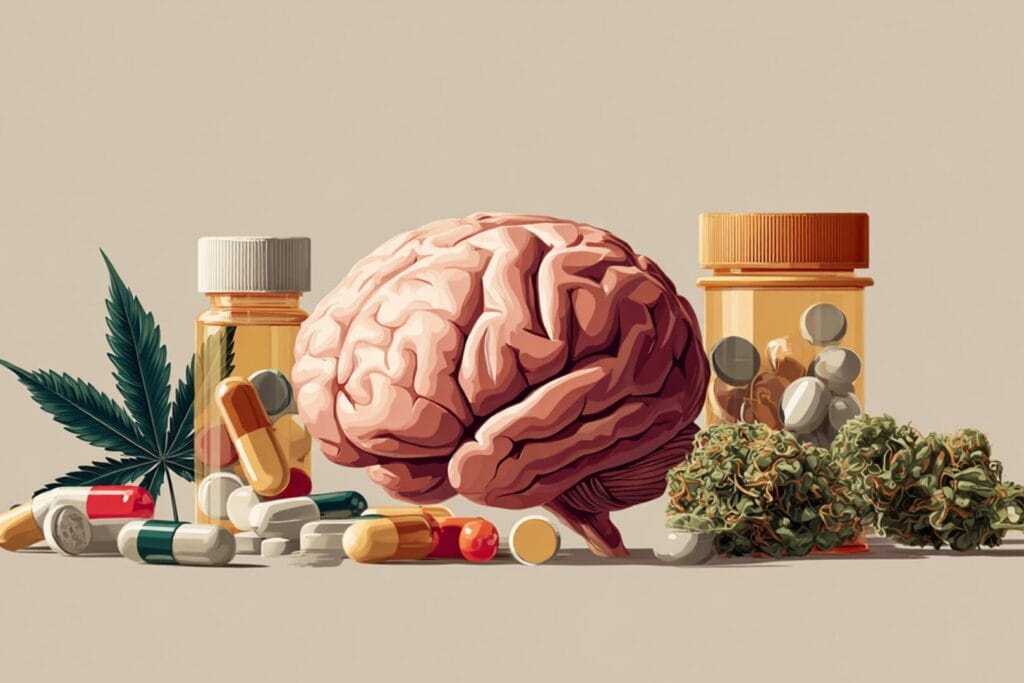Cocaine is a powerful stimulant that can profoundly affect the reward system of the brain, contributing to a sense of euphoria that can quickly escalate into a challenging cycle of dependence. While the initial effects of cocaine may be alluring, the toll it can take on your health and well-being can be devastating.
How Cocaine Works on the Brain and Body
Coming from the leaves of the coca plant, cocaine is usually found in one of two forms: powdered cocaine and crack cocaine. Both forms can be snorted, smoked, or injected and lead to rapid, intense effects on the users.
If you use cocaine, it quickly goes through your bloodstream and reaches your brain, which is where it exerts its main effects.
Cocaine blocks dopamine reuptake. Under normal circumstances, dopamine is released by neurons in response to pleasurable stimuli, and then it’s recycled back into cells. The use of cocaine interrupts this process because it binds to the dopamine transporter, preventing it from being reabsorbed. The result is an accumulation of dopamine in the brain.
The increased levels of dopamine in the brain are what lead to the high we associate with cocaine use.
Having this intense level of stimulation on the brain’s reward pathways can, however, lead to other adverse effects, including:
- The development of tolerance. When you repeatedly use cocaine, your brain gets used to elevated dopamine levels, diminishing your response to the drug. You might then start using increasingly high doses to get the euphoric effect you’re chasing.
- Neurotransmitter imbalances. Chronic cocaine use affects the natural balance of neurotransmitters in the brain, leading to long-term functional changes and contributing to cognitive deficits, mental health disorders, and emotional instability.
- Brain function and structure. As touched on, prolonged cocaine use can cause structural changes in your brain. The parts of your brain that may be significantly impacted include those involved in decision-making, memory, and impulse control.
Cocaine addiction develops because of its potent effects on your brain’s reward system, paired with the varying psychological and social factors influencing drug use.
Some of the reasons cocaine can be so addictive include:
- The powerful euphoric effects incentivize you to keep using the drug.
- Rapid onset of effects, along with the fact they’re short-lived. Cocaine’s effects usually only last a few minutes to an hour, so users take more doses to maintain their high, and this then increases the addiction risk.
- Psychological dependence can occur as you try to recreate the pleasurable feelings associated with use. The cravings can continue even if you don’t have a physical dependence.
- Many social and environmental factors, including stress, environmental cues, and peer pressure, often influence cocaine addiction.
6 Risks of Cocaine Addiction
The following are some of the many possible risks of cocaine addiction.
1. Chronic Mental Health Disorders
Addiction to cocaine and other substances often co-occurs with mental health disorders. You could experience symptoms of a new mental health disorder, or an existing disorder could get worse.
This occurs because chronic cocaine use interrupts your brain’s balance of neurotransmitters, and this leads to long-term mood regulation and emotional stability changes.
2. Severe Cardiovascular Problems
Using cocaine stimulates the sympathetic nervous system, and that can cause ongoing stress to your heart and blood vessels. This long-term damage can put you at risk of arrhythmias and heart attacks.
3. Cognitive Decline
With cocaine addiction and prolonged use, you may go through structural and functional changes in your brain. The areas of the brain most affected can include those parts responsible for executive function and memory. As a result, specific symptoms that can start occurring with cocaine use and addiction include impaired attention and memory loss, as well as an overall reduction of cognitive function.
4. Relationship Problems
Addiction is a compulsive disease, and what happens is that it leads you to prioritize the use of the drug over your relationships and social interactions. This can lead you to isolate yourself, causing a decline and deterioration of personal relationships.
5. Financial Instability
Cocaine addiction will impair your judgment and your performance at work. You might lose your job or find you’re facing financial challenges because of the high cost of sustaining your addiction.
6. Health Problems
There are a lot of health problems associated with cocaine addiction.
For example, if you smoke or inhale cocaine, it can irritate your respiratory tract and damage your lung tissue, causing long-term respiratory problems and lung damage.
Gastrointestinal problems can occur because cocaine use reduces blood flow to your GI tract, causing tissue damage and raising the risk of things like ulcers and bowel gangrene.
Using cocaine stresses the kidneys and raises blood pressure. That can then cause repeated episodes of a condition called rhabdomyolysis or muscle breakdown. These factors can cause long-term kidney damage and potential failure.
Nasal and sinus damage can occur if you snort cocaine because it damages the cartilage and mucous membranes of the nose.
Short and Long-Term Cocaine Effects
All the above effects are in addition to the short and long-term effects of cocaine that can occur even if you don’t meet the criteria for an addiction.
For example, short-term risks of using cocaine include:
- Heart attack
- Heart arrhythmias
- Hypertension
- Neurological effects like headaches, strokes and seizures.
- Respiratory arrest when high doses are used.
- Psychiatric symptoms like paranoia, agitation, aggression and anxiety.
- Stomach problems like nausea and vomiting or abdominal pain.
- Engaging in risky behaviors like impaired judgment or an increased likelihood of accidents.
Long-term risks of cocaine can include:
- Weakened heart muscle.
- Movement disorders similar to Parkinson’s.
- Psychosis.
- Suppression of the immune system
Get Help for Cocaine Addiction
Don’t wait for the consequences of cocaine addiction to escalate further. Contact San Diego Detox to learn more about our treatment options and start the journey to reclaim your life. If you or a loved one is struggling with cocaine addiction, we can help. We offer evidence-based treatment programs tailored to each person’s unique needs, and our team of dedicated professionals is committed to providing guidance, support, and medical care to navigate the path to recovery.
Frequently Asked Questions
Cocaine addiction can cause serious physical health problems including heart attack, arrhythmias, high blood pressure, impaired kidney function, respiratory damage, nasal and sinus damage, and gastrointestinal issues. Chronic use stresses the heart and circulatory system, can damage the lungs when smoked or inhaled, and may reduce blood flow to vital organs (which can cause ulcers or bowel gangrene). Early detection and treatment are vital to avoid irreversible damage.
Cocaine affects the brain by blocking dopamine reuptake, which causes an abnormal buildup of dopamine in the reward pathways and produces intense euphoria. Over time this results in tolerance (requiring higher doses), neurotransmitter imbalances, structural changes in brain regions responsible for decision-making and impulse control, and ultimately addiction. Understanding this mechanism can help individuals recognize when chemical dependency is developing.
Cocaine use and addiction significantly increase the risk of mental health disorders such as anxiety, depression, psychosis, mood instability, and cognitive decline. Chronic use disrupts neurotransmitter balance and can impair memory, attention span, and executive function. Addressing the psychological component is essential in treatment and recovery.
Short-term effects of cocaine include heart attack, arrhythmias, hypertension, seizures, respiratory arrest, paranoia, agitation, nausea, vomiting and impaired judgment.
Long-term effects may include a weakened heart muscle, movement disorders similar to Parkinson’s, psychosis, suppressed immune system, chronic cognitive deficits, organ damage and increased mortality.
Signs that it’s time to seek professional help include loss of control over use, inability to stop even when wanting to, developing tolerance (needing more drug for effect), withdrawal symptoms, neglecting responsibilities, social or legal problems due to use, and experiencing physical or mental health decline.
Professional treatment can provide medical support, therapy, and structured interventions to safely detox and recover.







